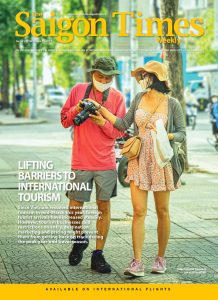As Vietnam reopens international tourism, attracting, developing and retaining a quality workforce has become the top priority for this industry.
With international borders reopening and tourism promotion campaigns being launched in Vietnam, hotels, tour operators and ancillary service providers across the country might be facing a major problem: a shortage of qualified labor.
During the worst period of the pandemic in 2020-2021, many tourism organizations had to reduce their experienced workforce. A report by the Ministry of Culture, Sports and Tourism revealed that tourism businesses cut staff by 70-80% in 2020.
In 2021, the number of full-time tourism employees was down to 25% of the 2020 level, and about 30% quit their jobs or had their contracts terminated. These workers have either returned to their original employment before tourism and hospitality or have found work elsewhere. Now, many of them are reluctant to return, especially if the salaries offered are low.
The severe imbalance between the supply and demand for qualified labor in tourism was a persistent issue even before the Covid-19 pandemic hit. In fact, pre-Covid statistics showed that only 42% of the tourism workforce had any training in the industry (vocational or otherwise), whereas 38% came from other economic sectors and 20% had no training.
Cooperation in education and training
The tourism industry should make a concerted effort to provide incentives to bring back trained employees, requalify older employees, and above all else, invest heavily in training facilities at all levels and develop hospitality schools with internationally recognized curricula.
There is budding talent in hospitality schools and universities ready to enter the labor market at the managerial level. The tourism industry should give them an opportunity, attracting them with high salaries.
At the government level, it is important to remember that educational efforts are essential to achieve Vietnam’s Strategy for Tourism Development to 2030. Developing human talent in tourism and hospitality is a priority under the Ministry of Culture, Sports and Tourism, and the National Administration of Tourism.
Coordination between the government, tourism businesses and tourism educational institutions is essential to ensure Vietnam’s tourism recovers fully from the Covid-19 pandemic. One thing the Government can do is offer tax incentives for private and not-for-profit organizations that provide tourism and hospitality training and certifications. Many businesses have excellent facilities that lend themselves well to on-the-job training, provided the costs are accounted for. This would expand the reach of educational and qualification efforts in tourism and hospitality in Vietnam, which are currently still insufficient.
Tourism businesses seeking to train/retrain and qualify/requalify their employees at all levels could also partner with educational institutions such as universities that offer tourism and hospitality degrees, as well as hospitality vocational schools and training centers. The joint use of facilities, on-site training seminars and workshops and the introduction of undergraduate and postgraduate certifications in tourism and hospitality are all ideas to be considered.

A focus on upskilling
In the new normal for tourism, skills in high demand include knowledge about safety and excellent people skills, as well as knowledge of IT and smart tourism. Smart tourism is becoming a reality, and future tourism and hospitality professionals should be prepared to work within that reality.
When it comes to foreign language skills, the obvious emphasis is on English. But due to the narrowing of the Chinese, Russian and Japanese markets, knowledge of other languages from emerging emitting countries such as Thailand and Malaysia will be sought after.
Educational institutions can help meet this demand by providing excellent academic knowledge along with practical skills. Universities such as RMIT Vietnam are educating the next generation of tourism and hospitality leaders, developing both the theoretical and practical knowledge of the industry, as well as providing them with a solid foundation in business management, financial and marketing acumen, soft skills and English proficiency at the highest level.
Concurrently, employers can and should invest more in in-house training to upskill and requalify their current workforce, but this should be done in addition to other educational efforts. It is important to remember that such in-house training consumes a substantial amount of resources, which is not abundant for a lot of organisations after such difficult Covid-19 times. Thus, in-house training is a great opportunity to pursue and establish partnerships with educational institutions, whether at the public, private or not-for-profit levels.
Tourism and hospitality is one of the largest industries in the world. If history has shown us anything, it is that while tourism crises may occur, they are short-lived and tourism always rebounds faster and stronger than ever. This is what we are experiencing right now. At present, the outlook is excellent for those looking for a career in tourism and hospitality, as they will have their pick of jobs provided they are qualified and passionate about the industry.
(*) Dr Nuno F. Ribeiro, senior lecturer and research cluster lead, Tourism and Hospitality Management, RMIT University Vietnam









